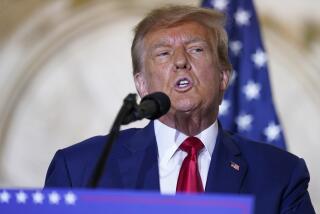Ex-Independent Counsel May Face Investigation
- Share via
WASHINGTON — Robert W. Ray, who resigned last week as Whitewater independent counsel, may soon find himself under investigation to determine whether he breached legal restrictions barring partisan political activity by federal prosecutors.
Sen. Patrick J. Leahy (D-Vt.), chairman of the Senate Judiciary Committee, made public on Tuesday letters he wrote to David Walker, head of the General Accounting Office, and to Atty. Gen. John Ashcroft asking for separate investigations of Ray, who has announced plans to seek the Republican nomination for the U.S. Senate from New Jersey.
Ray has strongly denied any impropriety as independent counsel. His office completed investigations into a failed Arkansas land deal known as Whitewater and into former President Clinton’s relationship with onetime White House intern Monica S. Lewinsky.
Even though Ray resigned his office six days after his final report on the Lewinsky investigation was released this month, Leahy said Ray “may have engaged in improper political activity” in planning his New Jersey race while serving as the independent counsel. Ray was sharply critical in the March 6 report, saying he could have obtained an indictment of Clinton had Clinton not admitted last year that he had been untruthful.
A spokeswoman for the GAO, the auditing and investigative arm of Congress, said the agency must comply with requests from committee chairmen. But Laura Kopelson said, “It’s too early to say how we intend to respond because we will have to sit down and discuss the matter with Mr. Leahy.”
Justice Department officials had no immediate comment.
Leahy said that by interviewing consultants and staff for his New Jersey race and “lining up financial backers,” Ray may have violated the federal Hatch Act as well as Justice Department regulations that apply to independent counsels. Ray has acknowledged speaking to a Republican gathering in New Jersey last month.
Referring to Ray’s 17 months as independent counsel, a post in which he succeeded Kenneth W. Starr, Leahy said in his letters that “those who accept the responsibility of such a special appointment . . . must bring single-minded focus and unassailable impartiality to their investigations [and] it was that role which Mr. Ray swore an oath to fulfill.”
Stephen Gillers, a legal ethics authority at New York University, said Ray probably did not breach any regulations unless there is evidence “that he behaved as a candidate” while still serving as independent counsel.
“There’s a fine line and it’s not possible to be precise about where it is,” Gillers said. “But I think he’d be allowed to have informal private conversations with close friends or relatives about running for office. Such conversations, of course, could not be allowed to influence his decisions as a prosecutor.”
Another ethics authority, Mary M. Cheh at George Washington University, said an investigation would be useful. “This illustrates the problems of independent counsels and why the law was not renewed [in 1999],” Cheh said. “It surely violates the spirit of what we thought these prosecutors were all about.”
Ray, a top assistant to Starr before succeeding him, defended his conduct against charges of politics in a statement posted on his Web site. His statement followed similar accusations made earlier this month by Rep. John Conyers Jr. (D-Mich.).
Ray said he had not violated the Hatch Act’s prohibition against political activity “either in letter or spirit.” Before his resignation on March 12, Ray said he had “not filed as a candidate or as a nominee” and had “not sought or solicited campaign contributions, raised money or sought or received endorsements.”
He acknowledged attending a Lincoln Day dinner sponsored by the Monmouth County Republican Club on Feb. 10. “I gave a speech principally honoring President Abraham Lincoln’s birthday because I was asked to do so [but] I did not appear in support of or in opposition to any candidate, whether myself or anyone else,” he said.
As to Justice Department regulations on prosecutors, including independent counsels, Ray acknowledged being bound “by those policies respecting enforcement of the criminal laws,” adding that counsels may be removed for “good cause” only by the attorney general.
More to Read
Get the L.A. Times Politics newsletter
Deeply reported insights into legislation, politics and policy from Sacramento, Washington and beyond. In your inbox twice per week.
You may occasionally receive promotional content from the Los Angeles Times.









